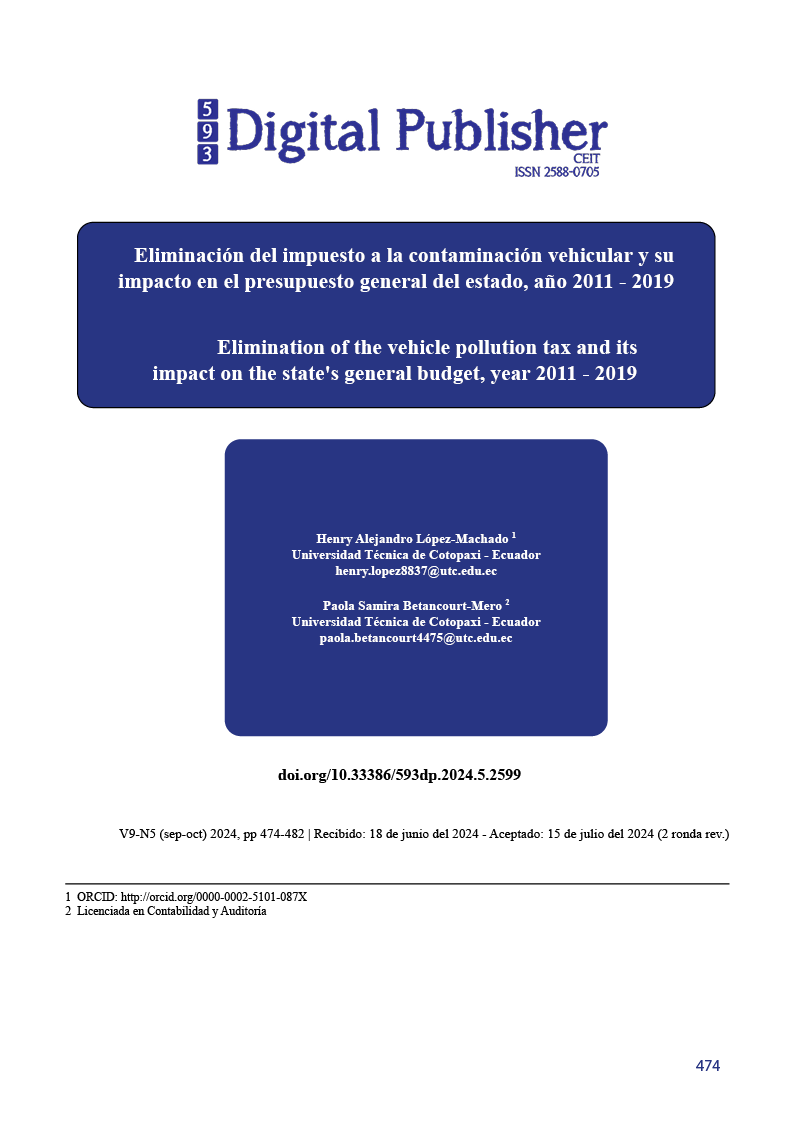Elimination of the vehicle pollution tax and its impact on the state's general budget, year 2011 - 2019.
Main Article Content
Abstract
Environmental taxes are created based on the needs of a society and these are used as a solution to execute projects for the care and maintenance of the environment. The objective of this research work was to determine, through a statistical analysis, the impact of the elimination of the tax on vehicular environmental pollution on the General State Budget. A quantitative methodological approach and a correlational scope with a cross-section were used, based on data collected from the Internal Revenue Service (SRI) and the Automotive Business Association of Ecuador (AEADE), a simple regression analysis was used with its respective graph, as a result a percentage of variability r2 of 3.49% was obtained in the general budget with the vehicle pollution tax respectively. In conclusion, the environmental tax, compared to other taxes, does not have a degree of significance in the general budget of the state, since the income it receives is not as gradual as the global income tax and the value added tax. who represents all general taxes, despite this the elimination of this tax had a minimal economic impact and a strong environmental impact, because at the end of it all; This collection received income to guide and administer them to the sustainability of environmental projects.
Downloads
Article Details

This work is licensed under a Creative Commons Attribution-NonCommercial-ShareAlike 4.0 International License.
1. Derechos de autor
Las obras que se publican en 593 Digital Publisher CEIT están sujetas a los siguientes términos:
1.1. 593 Digital Publisher CEIT, conserva los derechos patrimoniales (copyright) de las obras publicadas, favorece y permite la reutilización de las mismas bajo la licencia Licencia Creative Commons 4.0 de Reconocimiento-NoComercial-CompartirIgual 4.0, por lo cual se pueden copiar, usar, difundir, transmitir y exponer públicamente, siempre que:
1.1.a. Se cite la autoría y fuente original de su publicación (revista, editorial, URL).
1.1.b. No se usen para fines comerciales u onerosos.
1.1.c. Se mencione la existencia y especificaciones de esta licencia de uso.
References
Acquatella, J., Bárcena, A., & Bárcena, A. (Eds.). (2005). Política fiscal y medio ambiente: Bases para una agenda común (1. ed).
Cullen, B. (2023). Efectos de la eliminación del impuesto a los productos de gestión menstrual en el precio final y en el bienestar de los hogares. https://www.cefp.gob.mx/portal_archivos/convocatoria/pnfp2023/L-01_2023.pdf
Dagnino S., J. (2014). Refresión Lineal. Revista Chilena de Anestesia, 43(2). https://doi.org/10.25237/revchilanestv43n02.14
Gómez, M. (2009). La financiación autonómica y la eliminación del Impuesto sobre el patrimonio: Dos alternativas financieras para compensar la pérdida recaudatoria. Anuario jurídico y económico escurialense, 42, 353-376.
Parra, W. (2022). Eliminación del impuesto a la contaminación ambiental vehicular y su impacto en la imposición ambiental en el Ecuador en el período 2020. Universidad Técnica de Ambato. https://repositorio.uta.edu.ec/bitstream/123456789/35195/1/T5334i.pdf
Pérez Llamuca, D. E. (2022). Eliminación del impuesto a la renta de ingresos provenientes de herencias, legados y donaciones y la afectación a la redistribución de la riqueza en el Ecuador [bachelorThesis]. https://repositorio.uta.edu.ec:8443/jspui/handle/123456789/36700
Ricciardi, M. (2007). Análisis de eficiencia en el Iva [Revista Digital]. https://www.eumed.net/cursecon/ecolat/ar/2008/mar.htm
Singuenza, S. N., Sandoval, K. S., Instituto Superior Tecnológico Daniel Álvarez Burneo, Ecuador, Vizcaino, A. M., Instituto Superior Tecnológico Daniel Álvarez Burneo, Ecuador, Giron, E. A., Instituto Superior Tecnológico Daniel Álvarez Burneo, Ecuador, Erazo, S. P., Instituto Superior Tecnológico Daniel Álvarez Burneo, Ecuador, Jimbo, L. E., & Instituto Superior Tecnológico Daniel Álvarez Burneo, Ecuador. (2020). La política fiscal y su incidencia en la cultura tributaria del Ecuador. Espacios, 41(47), 161-175. https://doi.org/10.48082/espacios-a20v41n47p12
Thomé Chapanta, M. E. (2020). Eliminación del Impuesto a la Salida de Divisas y su impacto en la recaudación tributaria en el Ecuador [bachelorThesis]. https://repositorio.uta.edu.ec:8443/jspui/handle/123456789/31738
Vila, A. (2020). Correlación lineal y Análisis de regresión. Universidad Abierta de Cataluña.
Wolf, R., Mohamed, A. A., Gomes, F. S., Gurgel, A. C., & Teixeira, E. C. (2020). Impacto de la eliminación de impuestos sobre el consumo de alimentos y productos agrícolas en Brasil. América Latina Hoy, 86, 123-143. https://doi.org/10.14201/alh.21303



